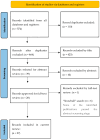Polymorphisms of the HTR2C Gene as Predictors of Metabolic Disturbances During Clozapine Therapy: A Systematic Review and Meta-Analysis
- PMID: 40507625
- PMCID: PMC12156949
- DOI: 10.3390/jcm14113861
Polymorphisms of the HTR2C Gene as Predictors of Metabolic Disturbances During Clozapine Therapy: A Systematic Review and Meta-Analysis
Abstract
Background/Objectives: Clozapine, the gold-standard treatment for treatment-resistant schizophrenia, is linked to metabolic disturbances such as weight gain and metabolic syndrome (MetS). Methods: This systematic review and meta-analysis evaluated the association between HTR2C polymorphisms and these adverse effects. Following PRISMA guidelines, 27 studies (n = 4044 patients, including 1804 clozapine-treated) were analyzed. Results: A meta-analysis revealed that the rs3813929 T allele was associated with a smaller increase in body weight, showing a mean BMI difference of 0.59 kg/m2 (95% CI: -1.02 to -0.17; *p* = 0.006), particularly in males. The rs1414334 C allele doubled MetS risk (OR: 2.15; 95% CI: 1.42-3.27; *p* = 0.0003). Haplotype analyses suggested combined genetic effects, though findings for other polymorphisms were inconsistent. Key limitations include study heterogeneity, small sample sizes, and the predominance of mixed antipsychotic regimens (clozapine with other psychotropics) in included studies, potentially confounding metabolic outcomes. Despite this, rs3813929 and rs1414334 emerge as promising pharmacogenetic markers for predicting metabolic risks. Conclusions: These results highlight the need for large-scale, prospective studies across diverse populations to validate associations and optimize personalized monitoring strategies. Implementing genetic screening could enhance early intervention, improving long-term outcomes for clozapine-treated patients.
Keywords: HTR2C gene; clozapine; genetic; metabolic adverse effects; obesity; polymorphism.
Conflict of interest statement
The authors declare no conflicts of interest.
Figures
References
-
- National Cholesterol Education Program (NCEP) Expert Panel on Detection, Evaluation, and Treatment of High Blood Cholesterol in Adults (Adult Treatment Panel III) Third Report of the National Cholesterol Education Program (NCEP) Expert Panel on Detection, Evaluation, and Treatment of High Blood Cholesterol in Adults (Adult Treatment Panel III) final report. Circulation. 2002;106:3143–3421. doi: 10.1161/circ.106.25.3143. - DOI - PubMed
-
- Alberti K., Zimmet P., Shaw J. Metabolic syndrome—A new world-wide definition. A Consensus Statement from the International Diabetes Federation. Diabet. Med. 2006;23:469–480. - PubMed
Publication types
Grants and funding
LinkOut - more resources
Full Text Sources





